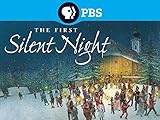
A farmer never knows which crop will produce one hundred-fold…neither do the rest of us it seems. Such was the case for an Austrian minister, Father Joseph Mohr, and a part-time organist, Franz Gruber, on a cold December night, Christmas Eve in fact, two hundred years ago this very night.
As final preparations were being made for the Christmas Service at St. Nicholas Church in Oberndorf, the church’s organist, Franz Gruber, pumped the organ pedals to lead the children’s choir in their chosen song. However, to their dismay, the organ notes never sounded, only a disheartening wheeze.
Father Mohr and his good friend, Franz Gruber, faced the disappointing dilemma of a message with no music. A Christmas Mass void of angelic voices mirroring the Heavenly Hosts. Hours before the service was set to begin, Father Mohr left his room in the church and walked outside in the dark, cold night, and gazed upon the multitude of stars in the sky. He was touched by the fact that those same stars had born witness to that first Christmas Eve, two-thousand years before above a meager manger in Bethlehem. Father Mohr ran inside, sat down, and penned the first line in what would become six verses of a new hymn, Silent night, Holy Night. All is calm. All is bright. A hymn that had been forming in his mind perhaps in pieces for some years as he often journaled praises to his Lord and Savior, but never an offering fully formed until this night.
Once he finished the verses, Father Mohr quickly met with the Franz Gruber and asked him to come up with a simple tune, a lullaby even, to accompany the verses. A tune easy enough for the children’s choir to learn prior to the Midnight Mass. And so, two hundred years ago, with the strumming of a guitar and the uplifted voices of two faithful men, the first singing of Silent Night graced the host of heaven and the little town of Oberndorf. Over time, the song proceeded to become a beloved Christmas carol sung all around the world in all different languages.
There are two things that strike me most about the history of Silent Night. First, it would have been simple to accept the situation of a broken organ and continue with the Christmas service without it. However, Mohr looked at a seemingly impossible set of circumstances and gave it his all. He chose to see an invitation, not a limitation, and got to work.
Secondly, while Franz Gruber did receive credit years later for his beautiful musical composition, and rightly so, Joseph Mohr died an unknown, penniless servant to the poor. He would never know this side of Heaven what his musical offering would mean to future generations. Father Mohr spent his short life serving the poorest of the poor, working to provide them with education, and spreading the gospel. In fact, he died in 1848 owning nothing but his guitar and the clothes he was wearing. There wasn’t even money to pay for funeral arrangements after his passing.
Like Joseph Mohr and Franz Gruber, we are servants of the Lord Jesus Christ. Disciples who are faced with daily tasks and choices. Choices to work with what we’ve been given, push past the present circumstances, and strive toward an eternal end that we as of yet cannot make out with our finite sight.
We never know what offering will have the greatest impact for generations to come. In honesty, our knowing is irrelevant, our name recognition is as well. Father Mohr and Franz Gruber had no idea the lasting strings of joy that Silent Night would provide the world when they first strummed the song two hundred years ago.
May we learn from the humble, faithful life of Father Mohr as we sing this night…Silent Night, Holy Night, All is calm. All is Bright.
Merry Christmas from our family to yours.

Sources for this post:









